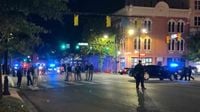Late on the night of October 4, 2025, the heart of Montgomery, Alabama was rocked by a mass shooting that left two people dead and twelve others wounded, sending shockwaves through the city and prompting calls for urgent action from leaders at every level of government. The violence, which unfolded around 11:30 p.m. at the intersection of Bibb and Commerce streets—a bustling downtown area filled with bars, restaurants, and hotels—occurred just after the Tuskegee University-Morehouse College rivalry football game ended at the nearby Cramton Bowl. The chaos that followed has reignited fierce debate over gun laws, public safety, and the future of Alabama’s capital city.
According to The Associated Press and Montgomery Advertiser, the shooting erupted when two parties began firing at each other in the middle of a crowd. Montgomery Police Chief James Graboys described the scene as "a mass shooting," explaining, "This was two parties involved that were basically shooting at each other in the middle of a crowd." The incident was particularly harrowing given the number of young victims: seven of the fourteen people shot were under the age of 20, with the youngest just 16 years old.
The two people killed were identified as Shalanda Williams, 43, and Jeremiah Morris, 17, both residents of Montgomery. Five of the wounded suffered life-threatening injuries, including a juvenile, while the remaining seven had non-life-threatening wounds. As of Monday morning, police had not made any arrests, and the investigation remained active, with local, state, and federal agencies collaborating to piece together what happened.
The shooting took place during an exceptionally busy weekend in Montgomery, which saw not only the Tuskegee-Morehouse football game but also Alabama State University’s homecoming at Hornet Stadium and the Alabama National Fair at Garrett Coliseum. The city was teeming with visitors and locals alike, making the violence all the more shocking and tragic.
Montgomery Mayor Steven Reed addressed the public the following day, vowing to pursue not only those who fired weapons but also anyone connected to the crime. "We’re gonna do whatever we can not only to arrest those responsible, we’re going to do whatever to arrest those connected in any way, who knew what may have happened, who knew what could take place," Reed said at a Sunday news conference. He was emphatic about the city’s resolve: "We’re not going just to stop with those folks that were pulling the trigger last night." Reed also lamented the shooters’ disregard for human life, calling the violence "senseless."
Alabama Governor Kay Ivey responded swiftly, announcing on Monday that the state would take a more active role in Montgomery’s public safety efforts. In a written statement, Ivey declared, "Let me be clear: All available state assets are being discussed, and ALL options remain on the table." She outlined a series of immediate steps, including extending the patrol zones for Capitol troopers to cover more of downtown Montgomery and utilizing the Metro Area Crime Suppression Unit—a coalition of local, state, and federal law enforcement formed in 2024 to combat rising violent crime in the city.
Governor Ivey also called for a review of state alcohol laws, specifically targeting licensed establishments in Montgomery that sell alcohol after 5 p.m. "All state assets are being evaluated to see what we can do more to prevent such things from happening in our capital city," Ivey said, underscoring her commitment to ensuring Montgomery’s safety. She added, "It’s imperative that we keep the capital city safe."
The governor did not mince words about the root of the problem, stating, "Alabamians lost their lives at the hands of thugs in downtown Montgomery this weekend." She acknowledged the state’s previous efforts, such as deploying the MACS Unit and passing new laws, but admitted, "Unfortunately, you can’t fix stupid. It is clear that to have a safe Montgomery, it is going to take more than these steps." Ivey pledged to ask the Alabama Legislature for additional resources to bolster state law enforcement downtown and to keep all options open for future interventions.
Mayor Reed, while welcoming state assistance, was quick to point out what he sees as a deeper issue: Alabama’s "lax" gun laws. He specifically criticized the 2022 law that ended the requirement for a permit to carry a concealed handgun in public, saying, "Today, anyone can carry a concealed weapon without a license or training. That’s a change from just a few years ago, when permits helped keep firearms out of the hands of people with violent backgrounds." Reed and the City Council had previously attempted to require anyone openly carrying a firearm to show identification upon request, but the initiative was abandoned amid fears it would cost the city state funding. "That is a problem, not a solution," Reed stated.
Reed also praised the police response, noting that five officers were very close to the scene when the shooting began, including one within 50 feet. Despite the proximity of law enforcement, the rapid escalation and confusion of the incident made it difficult to prevent casualties. The mayor stressed, "We welcome any assistance the state is willing to provide. But real safety requires more than additional troopers or task forces—it requires the courage to confront the culture of easy access to guns and a lack of responsibility among those who carry them."
The shooting and its aftermath have sparked a flurry of political commentary. Alabama Attorney General Steven Marshall criticized Montgomery’s leadership, saying the city is in crisis—a claim Reed disputed, asserting that the attorney general was unaware of the city’s ongoing efforts. U.S. Senator Tommy Tuberville, who is seen as a frontrunner for governor in 2026, echoed concerns about crime in Montgomery, posting on social media, "Crime has become too common in Montgomery, and this cannot continue. It’s past time for city leadership to take responsibility and put an end to this." Alabama GOP Chairman John Wahl called for federal assistance, while State Representative Patrick Sellers agreed with Reed that permitless carry laws have contributed to the rise in crime, stating, "It actually gives too much access. There has to be some checks and balances. Some control."
Montgomery County District Attorney Azzie Oliver also weighed in, describing the city as being in "crisis mode." She expressed condolences to the victims and their families, writing, "Gun violence has once again shattered lives and shaken our community to its core. We must admit that Montgomery is in crisis mode. Nothing will change unless we make changes. No one thing is the solution. However, it is essential that we recruit and support law enforcement, are tough on criminals, and support the judges who keep criminals locked up."
As Montgomery reels from the violence and leaders debate the best path forward, the city’s sense of community and history remains strong. But the events of October 4 have left residents—and officials—grappling with tough questions about how to ensure safety and accountability in Alabama’s capital. The investigation continues, with police urging anyone with information to come forward, as the city searches for answers and a way to heal.





